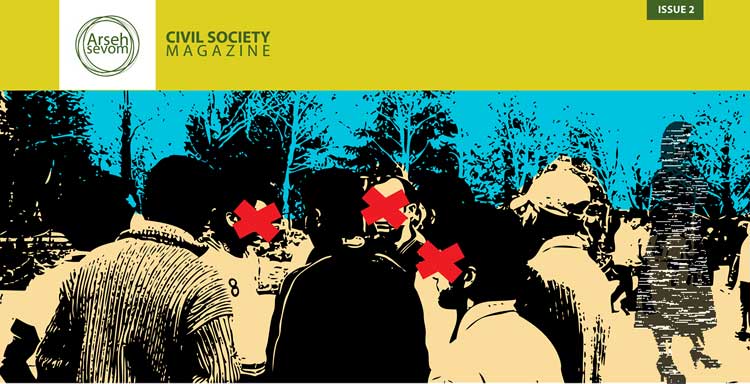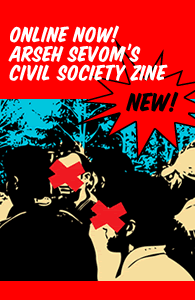
A letter from an Arab woman to her Iranian friend
November 22, 2011
Letter from the Editor
November 23, 2011Arseh Sevom spoke with Jasmin Nordien, a South African activist who has been involved in a number of civil society organizations. Throughout the 1990s, Nordien worked with the organization Network of Independent Monitors, which monitored and documented state violence in South Africa and supported grassroots groups with access to a range of services, namely, legal services, counseling, to accompanying victims of violence to get medical help.
The Network of Independent Monitors (NIM) was founded to counter and monitor the apartheid state’s brutality as it responded to the growing opposition to the apartheid regime. The organization provided support to those affected, including legal support. They monitored and reported on state-sponsored violence, making it public with the help of sympathetic parliamentarians who ensured that the reports made their way into official records.
The Network was more than a single organization, it unified a variety of civil society groups and activists with similar objectives, including religious institutions, human rights organizations, peace and development organisations, research organisations, and civil society organizations. This helped to provide an overview of how the apartheid state was systematically destabilizing society.
Arseh Sevom: What was your first significant external challenge?
Jasmin Nordien: When I attended my first network meeting, I was 22 or 23 years old, the youngest member in the group. I was shocked by the immature and childish behavior of group members. Everybody around me was a director or project manager, but when I looked around the room, I basically saw three-year-olds in adult bodies throwing tantrums when they could not get their way. It was unbelievable; I guess I expected more from those in leadership positions. Realizing that you deal with people, who bring their emotional selves to the work environment, and you have to find a way to work with these individuals. That was a big learning experience for me. What I learned about leadership is that people, as individuals are human; they have needs, desires, ambitions, strengthens and weaknesses, and you have to firstly, be aware of these and, secondly, learn how to cater to and constructively engage those needs, desires, etc.
This got me thinking about the differences between leadership and management. Organizations and movements are often founded by charismatic visionary leaders, and the functions of management and leadership are merged. That creates a lot of conflict within the organization that spills over to its function and even its survival.
In the province where I worked, there were a number of network individuals who had a clear understanding of NIM’s role and mandate in facilitating change, and they also had a clear understanding of what was happening in apartheid South Africa. So when NIM had fulfilled its mandate and function, they pushed for a neat and organized closing of the provincial office. In other provinces, the closure was not so neat.
Arseh Sevom: What you say about the difference between leading and managing is so interesting.
Jasmin Nordien: Often when an organization starts out there aren’t enough resources to have both leaders and managers, so need forces the two together. This happens out of need, but as the organization expands, itis hard for individuals to give up that power and to change the organizational culture and processes that emerged when the organization started.
Arseh Sevom: How did your organization overcome that challenge of leadership and management?
Jasmin Nordien: There were individuals in the network and individual organizations that were really clear about their mandate and role. They were able to be true to their mandate and also to hold the provincial network accountable to it’s mandate and role of the organization. So when their mandate expired because it was no longer relevant, they could neatly close down and the network functions that needed to continue was devolve into other organizations functions.
This was not only about clarity of mandate, but also about individual leadership. There were people who could say, “Society is changing, and there is a larger need in society than us perpetuating ourselves as a network.” They were very clear about how the network had fulfilled its mandate and role . Now there was a need to focus on building a new South Africa as opposed to monitoring the old South Africa. That shift of energy needed to happen, and it was individuals who pushed that.
Arseh Sevom: What are the most important things you learned?
Jasmin Nordien: The one thing I learned after working at NIM was that I no longer wanted to monitor the society I did not want to live in. I wanted to build the kind of society that my children and grandchildren would group up in. There was a mental shift for myself as an individual, that was reflected in the civil society organizations around me as well.
I also learned that it is important for organizations in highly political situations to manage information and disinformation. NIM was actively involved in making sure that clear information was put out there and countering disinformation about the organization, individuals, and the work it did. Rumor mongering in political situations can quickly generate a lot of conflict.
The third thing I took away from this experience is that when a number of organizations do similar work it is important to cooperate with one another and with individuals in the field. It is important not just to share information, but also staff. Building relationships and cooperating with others to achieve a larger goal is really important.
Arseh Sevom: Those are really valuable lessons, especially for us.
Jasmin Nordien: Lets not be romantic about peace work, there is usually fierce competition for resources and a need for survival. The competition for survival is tough. It takes leadership, a few individuals who really understand and believe in what they are doing to coalesce a situation. When I started working as an activist, I did so because I believed in the work I was doing. Since then, peace-building as a field has become an industry. People work in the peace industry for different reasons, some people work because they believe they can make a difference in the world, some people it is merely a job and stable salary, and for others it is a goldmine where they can make a lot of money. Simply put, I think of it as peace missionaries versus peace mercenaries. There is competition for survival. It takes leadership, a few individuals who really understand and believe in what they are doing to coalesce a situation.
Arseh Sevom: Why did you become involved?
Jasmin Nordien: I became involved with conflict resolution through an American professor, Dr. Dudley Weeks, who conducted conflict resolution workshops for youth in South Africa. The workshops opened a new way of dealing with conflict for me. After going through the training, I became a volunteer. I wanted to contribute my skills to building a better society. I went furthered my studies, and eventually got a master’s degree in Peace Studies.
Jasmin’s Advice:
Second tier leadership: It is important to actively build second tier leadership within organizations. In our organization, the director worked with a small management team which was responsible for leadership and management. Actively building second tier leadership ensures the continuation of the organization. This was particularly true in South Africa where many leaders from civil society organisations became part of the new government after regime change. Organizations that built second tier leadership could continue. Those that did not were in disarray.
Sound financial and administrative systems: It’s crucial for organizations to have good and sound financial and administration systems. When these are not in place it leaves space for abuse and corruption. It’s also important for funders who need access to narrative and financial reports.
Be clear on who you are accountable to as an organization: Who are our constituents and whose interests are we as an organization serving? The constituents or donor organisations? Then align the needs of the organization, constituents, and donors. This prevents you from putting yourself in a situation when you are in conflict with the donor’s needs and interests, and the needs and interests of your constituents.
Staff development and mentorship: Organizations need to engage in staff development. An organization is only as good as the staff working for it. Organizations really have to invest in this. It doesn’t have to be expensive. It can be both formal and informal. Create opportunities for staff to expand their world view, to see other possibilities is important because they will bring that back to their organization and society. This can happen through training and staff exchanges etc.
Deal with conflict in the organization and amongst staff: What I found important was that there need to be clear spaces allocated where individuals could come together to deal with issues of conflict. Those spaces were either formal or informal. In our organization we had something called ‘open space or free land’. This was the final point on the agenda of the weekly/monthly staff meeting. At the end of every meeting, we created a space people to deal with conflict and to bring in issues that were not being addressed elsewhere.
Support networks for female leaders: One of the support initiatives that I thought was excellent, even though I was not a part of it, was having a monthly support meeting for female directors or leaders in theprovince. There was very little support for women in leadership positions. Women leaders were invited to join and became part of monthly conversations focused on about what it meant to be a woman leader. This space for women leaders is much needed in a highly patriarchal society.




